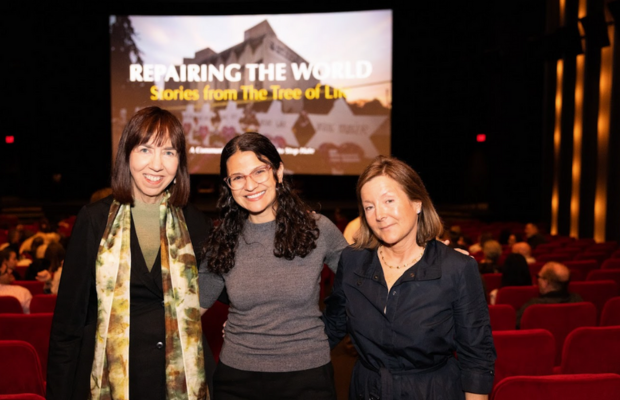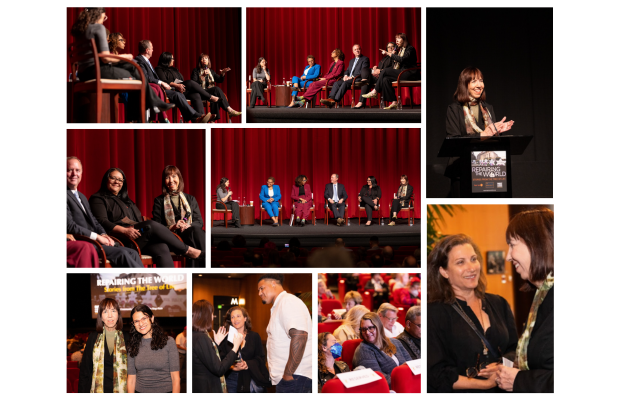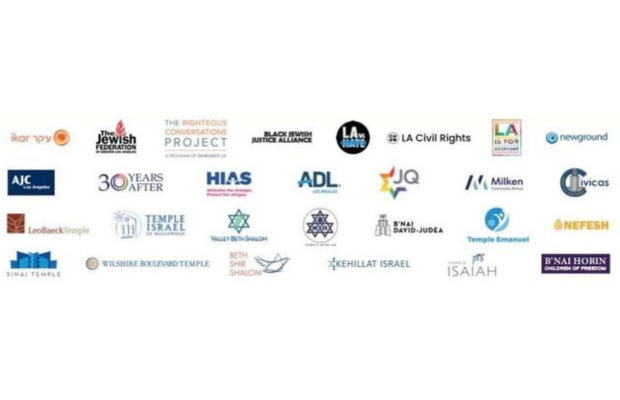|
On May 1st, more than 300 people gathered at Directors Guild of America for a screening of Repairing the World: Stories from The Tree of Life. In collaboration with IKAR Congregation, Not In Our Town, The Righteous Conversations Project, and 30 faith based,civil rights, and civic organizations, Angelenos viewed a short version of the film and discussed how to address rising antisemitism and hate. IKAR’s Rabbi Sharon Brous led a meaningful conversation about unity, resilience, and hope featuring: Los Angeles Mayor Karen Bass, Congressman Adam Schiff, Congresswoman Sydney Kamlager-Dove, Aziza Hassan, Executive Director of NewGround, and the film's director Patrice O'Neill. Many thanks to Samara Hutman for organizing the event. Watch the panel discussion and see excerpts and photos below |
 |
|
NIOT co-director and filmmaker Patrice O'Neill with Rabbi Sharon Brous and The Righteous Conversations Project's Samara Hutman. All photos courtesy of the Gina Cholick Photography (Credit: Gina Cholick) |
Rabbi Sharon Brous of Los Angeles served as moderator and introduced the panel after the screening by saying, "Thank you. This is an incredible gift and I can't wait until the the rest of the world gets to see this film." Rabbi Brous pointed out the reports that have come out over the past couple of years from the FBI and the ADL documenting a persistent and an alarming rise in antisemitic incidents. These reports, she said, “tracking not only swastikas that are carved into the desks of our children in school, but also cases of assault and harassment, and real violence, are coupled with recent surveys that say now that nearly 20 percent of Americans hold antisemitic views. If that's the number that's willing to answer yes to the survey then we have to assume that the number is significantly higher.”
Rabbi Brous asked the panel to talk about what needs to be done to stop the hate, to stop the violence and talk about how we might be able to build a stronger and better city and country.
Reflecting on the film, Rep. Adam Schiff said, “I expected to to be traumatized by reliving what happened in Pittsburgh and it certainly was traumatizing, but I didn't expect to be so uplifted.
“The images of communities coming together, seeing Jews and Muslims embrace and come to each other's aid, and to see Christians and Jews come together, Blacks and Whites come together, and Asians experiencing the same experience of being the subjects of hate, but also joining together in love for a fellow community — it was was just so uplifting.”
“You could see that hate was being driven out and what I kept thinking was, how do we not wait for tragedy to bring us together? How do we not have to wait for another terrible tragedy in our community or in another community before we come together in love?”
Congresswoman Sydney Kamlager-Dove told the audience that she had gone to grad school in Pittsburgh, and remembered a city that was very segregated with “tensions around poverty and unemployment and I think we see that thread in so many other cities both big and small where communities are grappling with their existence and what coexistence means and oftentimes we think coexistence has to be binary. I'm here and you're not, how do we share the small amount of crumbs that seem to be available for all of us and that is where fear is bred and I think is where violence and intimidation and bullying and propaganda and rhetoric thrive.”
“So, to actually see this film and to see a change of perspective was important for me, " she said. “What was hopeful for me in the film were young people stepping into uncomfortable spaces and wanting to commit to learn about each other and to own biases and maybe judgment and things that they don't know in order to find understanding and how can we replicate that across all spaces.”
Executive Director of NewGround, Aziza Hasan, talked about how we break through the fear and the vulnerability that comes when you live in an impacted community so those connections can be made. “What makes me feel safe is these relationships, redefining what it is to be a neighbor — that you're there for me and I am there for you and that when we are truly there for each other. That's what truly makes us safe and so that's what helps me work through the fear it's knowing that people will be there for me."
 |
|
|
 |
|
The event’s sponsors are listed above. |
Add new comment